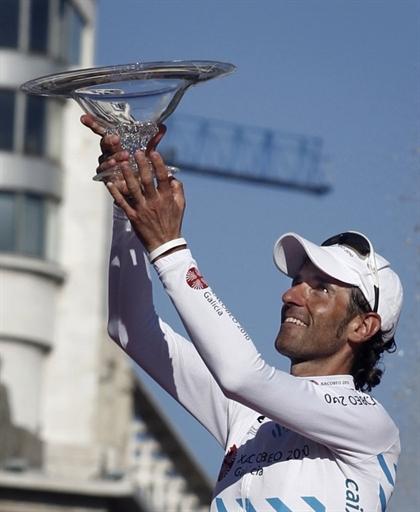"The knives were out for me" claims Mosquera
Spaniard attacks Spanish federation, former employer

After many months of keeping his counsel, Ezequiel Mosquera hit out in several directions as he confirmed that he will appeal to the Court of Arbitration for Sport against the two-year ban imposed on him after hydroxyethyl starch (HES) was detected in his sample at the 2010 Vuelta a España. Mosquera also indicated that he is likely to take action in Spain’s civil courts.
Mosquera positive at the Vuelta
Xacobeo Galicia pulls the plug
Xacobeo Galicia under investigation by Spanish police
Mosquera B sample remains to be tested
Vacansoleil-DCM list Mosquera in 2011 squad despite doping cloud
Xacobeo Galicia riders to ask UCI to help with back pay
Speaking at a lengthy and lively press conference in his home town of Teo in the north-western Spanish province of Galicia, Mosquera suggested that an example has been made of him for political reasons.
He said that the fact that hydroxethyl starch may be used as a masking agent for EPO had clouded the judgement of those overseeing his case and claimed this had reached the extent where the arguments made by his defence team were simply ignored when the final ruling on his case was made last week in Madrid.
"They had it in for me," he said. "It’s impossible for them to reach the point where they have sanctioned me without saying where this substance has come from. Hydroxethyl starch is not a masking agent, that’s an invention."
Mosquera said that "they had knives out for me" and compared his treatment with that of Alberto Contador following his positive test at the 2010 Tour de France for clenbuterol. He pointed out that Contador had received the support of Spain’s outgoing prime minister, José Luis Rodríguez Zapatero, as well as his newly-elected successor, Mariano Rajoy. "I’d like to know whether Alberto Contador would have received the same support had he had the same problem."
During a press conference that lasted more than an hour and a half, Mosquera saved most of his ire for the Spanish federation that handed out his sentence and the Galician regional government, which backed the Xacobeo-Galicia team for which he rode in 2010.
He criticised Spanish federation president Carlos Castaño because, claimed Mosquera, he had said that the rider would not be sanctioned if EPO was not detected in his samples. He speculated that his guilty verdict was the result of the fact that he rode "for a small team that had competed against the big ones".
Get The Leadout Newsletter
The latest race content, interviews, features, reviews and expert buying guides, direct to your inbox!
He also accused José Ramón Lete Lasa, Galicia’s secretary-general for sport and one of the main driving forces behind the Xacobeo team, of wanting to sink him in the sporting sense via what he alleged was an orchestrated campaign in the media.
He claimed that Lete had "asked that a hard line be taken" because Mosquera had "caused a lot of damage in Galicia". Alluding to Lete, Mosquera stated: "In the end the only person to turn their back on me was him and that was the straw that broke the camel’s back of all this garbage. Of all the blows that I’ve received, this was the one I was least expecting."
Mosquera’s agent, Juan Campos, alleged that Lete’s attitude towards the rider could have an economic motive as the Galician cycling federation still owes him an "important" amount of money. "I don’t know if this gentleman, Lete, is looking to gain something from this, but it is strange that the head of sport in Galicia was making a doing of manoeuvring in Madrid," added Campos.
Mosquera’s lawyer, Ignacio Arroyo, confirmed a further blow for the rider when he revealed that his two-year ban is set to run from the date of its announcement last week and will not cover any of the 14 months that Mosquera has spent out of racing since his positive test was announced. Initially suspended by Xacobeo, Mosquera was signed by Vacansoleil, but the Dutch team decided against allowing him to race until his case was resolved.
Peter Cossins has written about professional cycling since 1993 and is a contributing editor to Procycling. He is the author of The Monuments: The Grit and the Glory of Cycling's Greatest One-Day Races (Bloomsbury, March 2014) and has translated Christophe Bassons' autobiography, A Clean Break (Bloomsbury, July 2014).